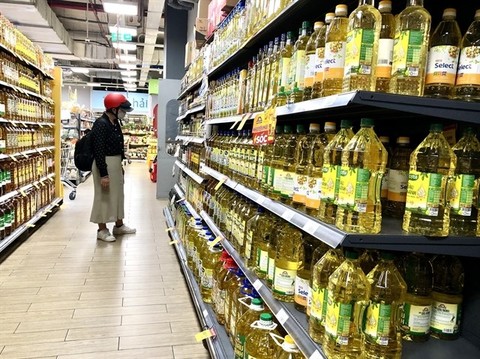
A consumer shops at a supermarket in HCM City. Tax reforms should accelerate economic growth in the long run. — VNA/VNS Photo Mỹ Phương
It’s time for Việt Nam to make a strong push towards tax reforms, including the passing of important tax laws to support the economy to recover and develop sustainably in the long run, experts have said.
The implementation of the tax reform strategy to 2030, as well as the amendments of major tax laws have been delayed for three years to aid the post-pandemic economic recovery, Hoàng Thùy Dương, head of Tax at KPMG in Việt Nam and Cambodia, said.
Tax collection in the first half of this year still met the target but the current tax policies are still biased towards economic recovery and consumption after the pandemic, he said.
“It’s time to pass important tax laws to support the economy to recover and develop in the long run,” Dương said.
With regard to the Việt Nam’s economic development and fiscal policies, Jochen M. Schittmann, representative of the International Monetary Fund in Việt Nam, said that since the pandemic, Việt Nam has implemented a number of large-scale tax reductions and exemptions, which significantly affect budget revenue. The tax policies implemented to aid post-pandemic recovery included reduction of value-added tax and environmental protection tax on petrol.
Statistics of the Ministry of Finance showed that proposed tax and fee reductions and extensions amounted to more than VNĐ900 trillion in 2020-24 period.
Jochen said that Việt Nam is making efforts to resolve medium-term challenges such as climate change, infrastructure development from railway, roads to wastewater systems and human resources development.
The country will need huge sums of investments in coming years, not only from the private sector but also the public investment, he said.
However, the ratio of tax collection to the State budget to GDP in Việt Nam is much lower than the average in the world, of emerging markets and of advanced economies, he pointed out.
Thus, tax reforms will help to raise resources, he said, adding that Việt Nam might reconsider tax incentives, expanding the tax base for value added tax and increasing environmental protection tax.
The ratio of tax collection to the State budget to GDP was estimated at around 19 per cent, equivalent to average of the Asia-Pacific region, Phan Vũ Hoàng, deputy director general of Deloitte Việt Nam, said. However, if social insurances are excluded, the ratio was quite low.
Việt Nam is largely dependent of revenue from value added tax and taxes on goods and services, around 43 per cent, still lower than ASEAN (47 per cent) and Asia-Pacific region (55 per cent).
There is significant room to increase tax revenue, especially from personal income tax when compared to member countries of the Organisation for Economic Co-operation and Development (OECD).
Hoàng, however, stressed that to increase personal income tax revenue should not be by increasing tax rates, but by increasing income of workers and official jobs.
Tax policy to encourage firms to grow
According to Nguyễn Quốc Việt, deputy director of the Việt Nam Institute for Economics and Policy Research, the proportion of value added tax in the budget revenue increased from 22 per cent in 2008 to 26 per cent, special consumption tax from 6 per cent to 8-9 per cent and individual income tax from 2-3 per cent to 8-9 per cent, import-export tax dropped from 11 per cent to 6 per cent.
A notable point is that the proportion of corporate income tax rose modestly from 16 per cent to 17 per cent. “Why?” he asked.
Vietnamese enterprises remain of small scale, Việt pointed out, adding that this is a problem, requiring greater efforts to promote the development of domestic enterprises, especially in the context that Việt Nam has a robust foreign direct investment (FDI) sector.
There are still many issues to increase budget revenue in a sustainable way but first of all, it is necessary to ensure that domestic motivation from consumption is not fading away, Việt said.
In the context of rising global uncertainty, the focus on domestic consumption and production is important to reduce the dependence on external demand, he added.
A number of major tax policies are being up for amendments.
Dương from KPMG said as Việt Nam is a highly open economy with import-export value equivalent to 200 per cent of the country’s GDP, impending tax policies adjustments will certainly affect the attraction of FDI as well as exports and imports.
In the last quarter of this year, the Government is expected to issue a decree on investment support fund in an effort to adopt the global minimum corporate income tax.
Dương said that corporate income tax incentives will no longer be attractive to attract large-scale FDI, requiring changes in the thinking for tax policies.
Secondly, the amended Law on Value Added Tax is expected to be passed at the National Assembly in October.
Previously, value-added tax was mainly on goods. However, in the context that Việt Nam’s participation in the global value chain is now different with businesses engaging more deeply in the service sector, that will change.
With proposal of zero VAT rate for export services, it is expected that Việt Nam might become a service exporting country, Dương said.
The amended laws on special consumption tax and corporation income tax are also expected to be passed in May 2025.
The current draft of the amended Law on Special Consumption Tax remains quite primitive, Dương said, adding that careful consideration is needed, especially the tax on electric vehicles and alcohol.
It’s also time to redesign corporate income tax in the context of global minimum tax adoption so that Việt Nam can attract investments from large corporations, he said.
Tax policies for small and medium sized enterprises should also be put into consideration. — VNS